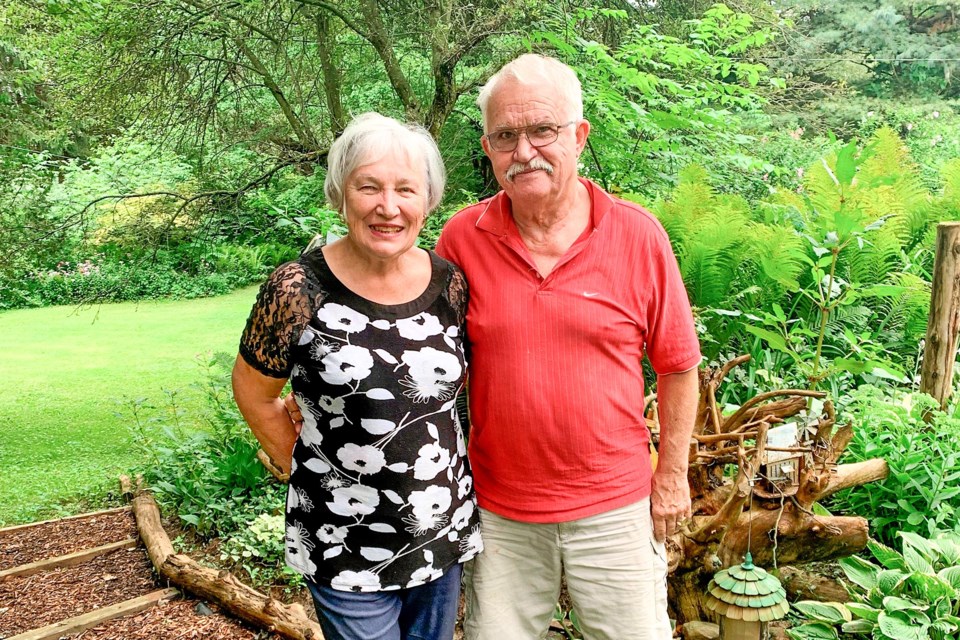Orest and Irene Haras spent years as educators teaching others while at the same time working hard to find places to expand their own knowledge and share their specialties.
Heading into a war zone seemed like a great way to keep on their toes.
“Our children really worried about us, and I have to say that when we made it across the border and back into Poland [from Lviv], there was a big sigh of relief,” says Irene from the coziness of the couple’s Fonthill front porch. “While we were in Lviv there was one situation where we were bunkered down due to the siren warnings and there was a gentleman there looking at an alert map of where the missiles were hitting and all of the area that we were in was in red. So that means the whole area is in danger and you’re saying to yourself: ‘Oh my god, are you ever stupid being here.’”
But even the scare of incoming missiles couldn’t keep the couple from backing down from what they are: native Ukrainians and teachers. In their home country from July 3-14, they were there to take part in a summer teaching institute and conference hosted by the Ukrainian World Congress. The purpose was to provide new ideas and fresh practices in a region that is doing its best to keep a semblance of normality amongst the violence and brutality brought about by the now nearly 540-day-old war between the former Soviet region and the current Russian regime.
“I was asked to participate in this conference five years ago, and it’s like any other conference,” says Orest. “There are keynote speakers, break out sessions. It’s a continuing education conference. Every five years teachers in Ukraine have to upgrade and this is one way they do it.”
Over the span of his career, which began in 1971 and included stops as a high school principal in Beamsville and Smithville, Orest taught phys-ed, art, and science, and was a mentor to many students and younger teachers. It’s the proven lessons that he learned here in Canada that he was most interested in sharing with the teachers of Ukraine.
“You try to get into what works here,” he says. “Our school system here is differently organized. But there are a lot of commonalities too. Like a principal’s role. How do you motivate and how, as a leader, do you get to the benchmarks that the country wants you to get to?”
For Irene, who began her teaching career in the late ‘60s in Etobicoke, before marrying Orest and moving to Niagara, the value of practical learning for any student is incredibly important. It’s not surprising then that she spent many years of her career as a cooperative education specialist. This was something the Ukraine officials were very interested in learning more about.
“Students differ in the ways they learn,” she says. “Some are academically inclined but others can’t handle French class at 2:30 in the afternoon. So why not put those kids out in the community in the areas they enjoy? Co-op education is a great way to try something out without investing years only to find out that you don’t like it.”
In a real way, that hands-on experience is exactly what the Haras’ received in their own right while in Ukraine. While Lviv did have its risks, the majority of the fighting in the country was taking place in a region far away — akin to the distance from Pelham to Montreal. Still, for both of them, it was important to be there amid the danger and uncertainty even if most of the time it didn’t feel like that.
“Everything was normal but there is always tension in your gut because if the sirens go off you have to go and hide,” says Orest. “So we are in this city, teaching and doing our thing, going to restaurants and using the streetcars and taxis, but then on a Thursday night the sirens went off and the boom happened and all the windows shake. But because everyone else seems to be functioning and going through the motions of life, you kind of get used to it.”
In all reality, the Haras’ wouldn’t have it any other way. Their time in Ukraine was immensely valuable to them as teachers, but also as proud Ukrainians.
“Being there was our contribution to the war effort, in our own way,” says Orest. “The resources that we brought, they took from us and asked if they can use them. And we tried to make them as current and as useful as we could.”



